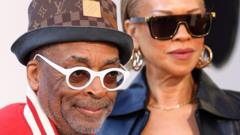Ed Sheeran's claim to cultural Irishness ignites debate over identity and belonging across generations, bridging personal history with national heritage.
What It Means to Be 'Culturally' Irish in 2025: A Multidimensional Perspective

What It Means to Be 'Culturally' Irish in 2025: A Multidimensional Perspective
The evolving identity of Irishness complicates cultural heritage discussions in 2025, as highlighted by Ed Sheeran's experiences.
Ed Sheeran's recent identification as "culturally Irish" has opened up discussions about what it means to embody Irish identity in a complex, interconnected world. The singer, raised in Framlingham, England, poignantly expressed his connection to Ireland, rooted in his familial lineage and experiences spent on Irish soil. Despite his English upbringing, Sheeran's declaration has invited mixed reactions from both sides of the Irish Sea, with critics questioning the authenticity of his cultural claim while others celebrate his pride in Irish heritage.
For Sheeran, claiming Irish culture is not merely a matter of citizenship; it's a reflection of his upbringing and musical influences. This sentiment resonates with Ros Scanlon from the Irish Cultural Centre in London, who echoes that acknowledging one's heritage enriches one's identity without negating other affiliations, like being British. Such complexity in identity is also becoming more acceptable, especially as Northern Ireland enjoys a newfound peace, permitting individuals to embrace multiple identities without choosing one over another.
Professor Linda Connolly suggests that Sheeran’s perspective transcends the rigid binaries surrounding national heritage, shedding light on a more fluid identity shared by many second-generation Irish in Britain. This notion expands across Northern Ireland's diverse narratives, where expressions of cultural Irishness thrive amidst a history marked by division. For instance, unionists may find pride in their heritage while engaging with cultural symbols from both traditions, demonstrating that identities can be multi-layered and inclusive.
The concept of 'culturally Irish' continues to evolve, encompassing humor, storytelling, music, and shared landscapes that shape communal experiences. Contemporary figures across a spectrum of artistic genres illustrate this, from Sally Rooney to British-born artists like Oasis, each contributing to a broad definition of Irishness that includes shared cultural elements influenced by history and migration.
As contemporary connections between cultural identities grow stronger through easy travel and shared media, newer generations are beginning to reshape their narratives, often dismissing past animosities. Academics like Caoimhe Nic Dháibhéid note that today’s youth may engage with Irish culture more for its modern relevance and less for historical context.
Ed Sheeran's narrative reflects the reality that identity is multifaceted and not dictated by borders or historical grievances. As various cultural influences intersect within an increasingly global society, Sheeran's embrace of his Irish heritage stands as a testament to the beauty of living as a fusion of identities.
By fostering an environment where personal connections to heritage are recognized and honored, we can aspire to inspire younger generations to envision a future free from rigid identity confines—encouraging embrace of the message shared by literary figures like James Joyce, who advocated for transcending imposed boundaries.




















